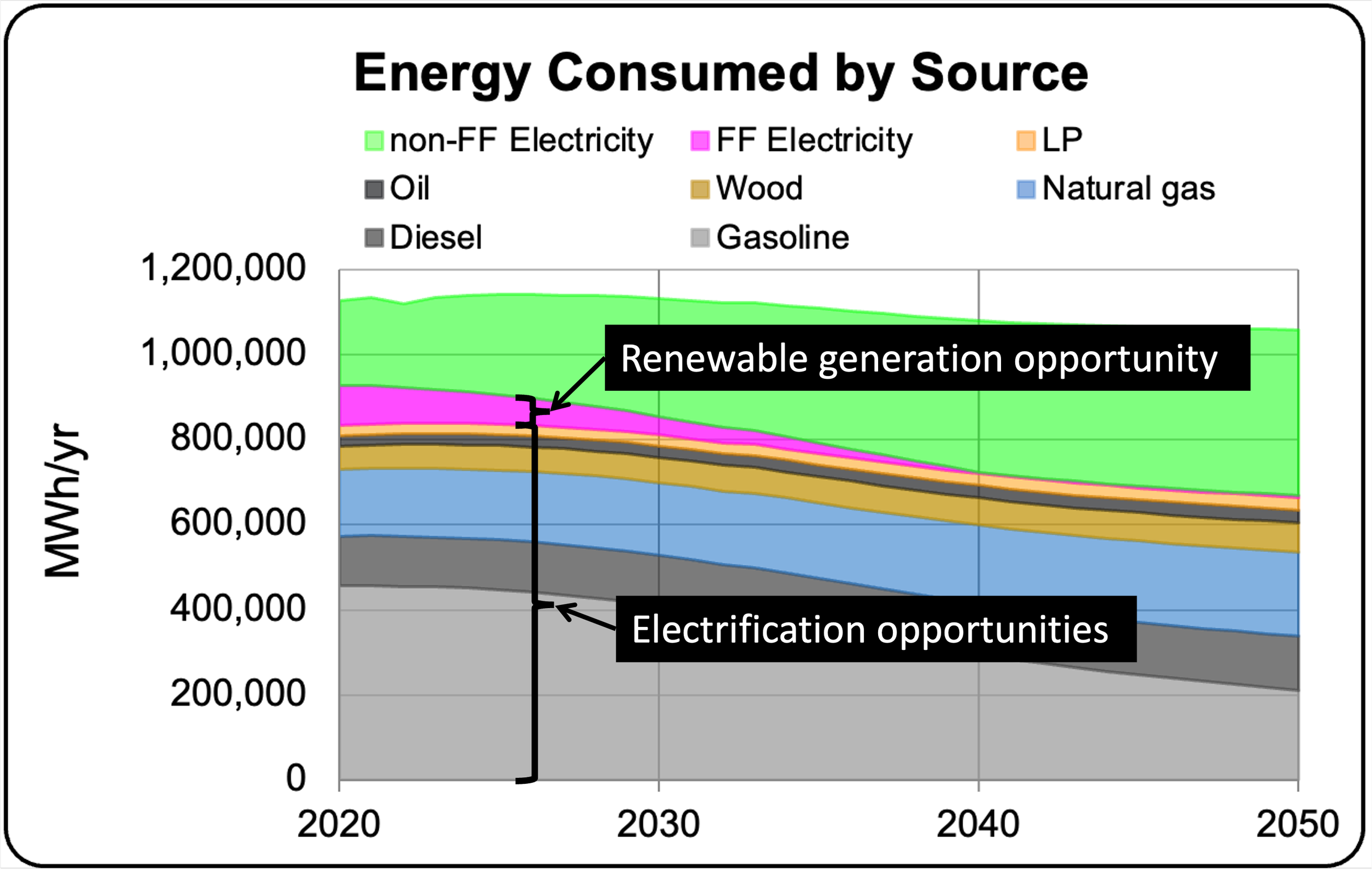The Gorge Clean Energy Coalition
The mission of the Gorge Clean Energy Coalition is to maximally accelerate benefits of the clean-energy transition in the Columbia Gorge, addressing vehicles and buildings, both residential and commercial.
Background of the Gorge Clean Energy Coalition: In 2018 Hood River County adopted a prescient Energy Plan, Goal 1 of which is to reduce fossil fuel usage by 30% by 2030, 50% by 2040, and 80% by 2050. These reductions correspond to annual energy savings of around $12 million, $25 million, and $52 million, respectively. To put that much savings in perspective, the total taxes collected by Hood River County in 2025 was $47,766,886.
However, as of 2025, we’ve reduced the county’s fossil fuel usage by less than 3%. The main fossil-fuel users are households and businesses who could be reaping those savings but haven’t yet adopted the clean-energy (electrified) options.
Energy by source in the county is dominated by local energy uses—mostly transportation and heating buildings. These comprise about 90% of the fossil fuel usage, so efforts to reduce fossil fuels must prioritize vehicles and buildings, both residential and commercial.
The Hood River County Energy Council, a volunteer group who advise local municipalities and community partners on implementing the Plan, recently teamed with the Columbia Gorge Climate Action Network to build a wide coalition to tackle Goal 1 with much more public education and outreach. Electrify Oregon's coaching network is a key contributor to the coalition, Sustainable Northwest will be collaborating on community engagement plans, and we expect more groups in the Gorge to join as this Gorge Clean Energy Coalition evolves, hopefully also spreading to Klickitat and Wasco Counties.
Clean-energy options now enable numerous household and community benefits:
Economic savings: The average US household would save over 50% on their annual energy costs by electrifying their transportation and house. The most economic approach for most households is to plan to replace the old vehicles and appliances with zero-emission options when replacement becomes necessary; and the capital (upfront) costs of clean-energy options keep dropping.
Cleaner air: If typical in-home air with a gas cooktop was outdoors, it would be illegal. Air pollution from oil and gas causes 90,000 premature US deaths annually. We’ve lived with fossil-fuel emissions so long that we tend to accept it—but’s it a huge health impact.
Comfort and safety: Replacing a gas furnace with an electric heat pump provides 3-5X better energy efficiency plus air conditioning. Additionally, heat-pump space heating options keep expanding, enabling greater comfort in more rooms. Removing gas appliances and gas service removes explosion risks.
Energy resilience: We’ve become so dependent upon grid electricity that a power outage usually shuts down most businesses and creates small or major hassles for households. Now standard home battery systems enable islanding from the grid, and the increasingly popular vehicle-to-home (V2H) capabilities of electric vehicles (EVs) will allow the much larger EV battery to provide household energy storage and transport.
Incremental climate mitigation: While the climate (greenhouse gas or GHG) emissions of a household or city or whole state are a tiny fraction of global GHG emissions, whole countries are accelerating their decarbonization because clean energy is cheaper. This is the only clean-energy benefit that is not local and immediate.
To address the challenge of creating widespread public interest and adoptions of clean energy, local non-profit organizations have joined the Gorge Clean-Energy Coalition to coordinate efforts and leverage their resources.
We know that you care about the Gorge, and your community leadership and influence are important elements of the solution.
How you can participate: Your leadership and your electrification experiences are critical to accelerating the clean-energy transition. You may have already electrified some of your house or vehicles. We want you to collaborate on spreading the word about your experiences, post an “Electrified Household” yard sign, or host a short open house to share your experiences with your heat pump, electric vehicle, solar panels, or whatever. We want more people using transit and active transportation modes. We want businesses to talk about their electrified fleet or buildings. A main activity of the coalition will be bimonthly or quarterly electrified open houses or businesses that include expert presentations and real-world experiences of neighbors. Resources for coaching and incentives are also available for households of most income levels. And we could use more electrification coaches, if you are a volunteer with deeper interests in helping others to navigate their options.
To track progress, the coalition will develop metrics for
how many people we reach,
how many people have taken the first step, to make an electrification plan for their household or business (for when a vehicle or appliance needs to be replaced),
how many people sign up for coaching,
how many people report new installations or vehicles,
etc.
Clean energy adoptions are local and social. While adoptions start with early adopters, word-of-mouth is important to spread information to friends and neighbors. One program of the coalition is providing yard signs to clean-energy households who wish to inspire their neighbors.







